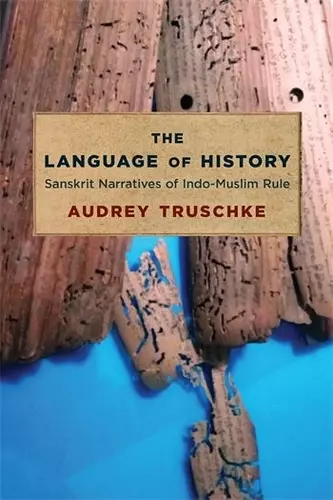The Language of History
Sanskrit Narratives of Indo-Muslim Rule
Format:Hardback
Publisher:Columbia University Press
Published:16th Mar '21
Currently unavailable, and unfortunately no date known when it will be back

For over five hundred years, Muslim dynasties ruled parts of northern and central India, starting with the Ghurids in the 1190s through the fracturing of the Mughal Empire in the early eighteenth century. Scholars have long drawn upon works written in Persian and Arabic about this epoch, yet they have neglected the many histories that India’s learned elite wrote about Indo-Muslim rule in Sanskrit. These works span the Delhi Sultanate and Mughal Empire and discuss Muslim-led kingdoms in the Deccan and even as far south as Tamil Nadu. They constitute a major archive for understanding significant cultural and political changes that shaped early modern India and the views of those who lived through this crucial period.
Audrey Truschke offers a groundbreaking analysis of these Sanskrit texts that sheds light on both historical Muslim political leaders on the subcontinent and how premodern Sanskrit intellectuals perceived the “Muslim Other.” She analyzes and theorizes how Sanskrit historians used the tools of their literary tradition to document Muslim governance and, later, as Muslims became an integral part of Indian cultural and political worlds, Indo-Muslim rule. Truschke demonstrates how this new archive lends insight into formulations and expressions of premodern political, social, cultural, and religious identities. By elaborating the languages and identities at play in premodern Sanskrit historical works, this book expands our historical and conceptual resources for understanding premodern South Asia, Indian intellectual history, and the impact of Muslim peoples on non-Muslim societies.
At a time when exclusionary Hindu nationalism, which often grounds its claims on fabricated visions of India’s premodernity, dominates the Indian public sphere, The Language of History shows the complexity and diversity of the subcontinent’s past.
Truschke demonstrates that the Sanskrit literary world was not simply an arena of elite male Brahmin scholars, but also one in which non-Brahmins, women, Jains, and a wider lay community of scholars and patrons had a voice. The lasting contribution of this work will be not simply its methodological or analytical innovations, but also firmly contesting and refuting the toxic Hindutva politics that has permeated debates about Sanskrit pasts, Hindu-Muslim interactions, and the nature of Hinduism and Islam itself in the last century. -- Purnima Dhavan, author of The Lords of the Pen: Literary Associations in Early Modern South Asia
Unpacking a rich archive that is scattered or largely ignored, Truschke skillfully probes how Jains and Brahmins assessed Muslims and their rule and how those assessments changed over a millennium. This book offers fresh insights into the contested issue of cultural encounter in India’s history. -- Richard M. Eaton, author of India in the Persianate Age: 1000–1765
Few questions in premodern Indian studies are as fraught as the nature of historical consciousness—save for the nature of Indo-Muslim rule. Truschke takes on both, demonstrating not only the vitality of history writing in Sanskrit culture but also its intense political engagements. This is scholarship of the highest order. -- Sheldon Pollock, Arvind Raghunathan Professor of Sanskrit and South Asian Studies, Columbia University
In this masterful survey of literary narratives referring to Muslim rulers, Truschke once again publicizes Sanskrit’s participation in the world of premodern politics. Sweeping in its scope, incisive in its analysis, and crisp in its prose, The Language of History demonstrates Sanskrit’s continuing vitality and creativity in a pluralistic age. -- Cynthia Talbot, author of The Last Hindu Emperor: Prithviraj Chauhan and the Indian Past, 1200-2000
Sanskrit texts provide an archive for the study of the second millennium CE that historians have known of but have hardly explored. Truschke’s study demonstrates that Sanskrit histories of the period are partly a continuation from the past and partly a pointer to the new. Her analysis of these texts provides a necessary fresh perspective. -- Romila Thapar, author of Early India: From the Origins to AD 1300
The author meritoriously introduces a broader definition of written history and demonstrates how the analysis of literary aspects as a device for writing history within Sanskrit texts can be a promising study for present-day historians and philologists as well. * Contributions to Indian Sociology *
A detailed and nuanced examination of a new and relevant topic and is of clear interest for readers interested on both broad subjects, such as the philosophy of history, as well as more specific ones, such as Sanskrit historiography, aesthetics and lexicography, Indo-Muslim history, and the premodern representations of ideal and counter-ideal types in Indo-Muslim India. * Práticas da História *
ISBN: 9780231197045
Dimensions: unknown
Weight: unknown
376 pages